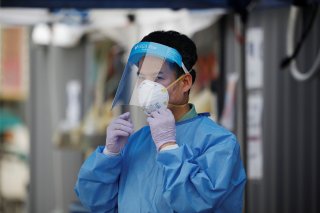Are Face Shields Effective Against Coronavirus?
Fauci called the use of goggles and eye shields as “perfect protection” from COVID-19, but also said that it’s not “universally recommended.” What should you do?
Most medical experts are now on board with the idea that face masks and coverings are a must in limiting the spread of the novel coronavirus.
But what about face shields?
This protective gear—simply a curved plastic or plexiglass panel attached to a headband—has long been used in health-care settings. It is often worn during medical procedures and surgeries in which bone fragments, blood, or other bodily fluids could get into the eyes, nose, and mouth.
A study in 2014 revealed that when tested against an influenza-infused aerosol from a distance of 18 inches away, a face shield was able to reduce the exposure by 96% during the time period immediately after a cough.
A face shield also was shown to lower the surface contamination of a respirator by 97%.
Despite these findings, the U.S. Centers for Disease Control and Prevention still does not recommend wearing face shields for normal everyday activities or as a substitute for cloth face masks and coverings.
“At this time, it is not known what level of protection a face shield provides to people nearby from the spray of respiratory droplets from the wearer,” the CDC states.
“There is currently not enough evidence to support the effectiveness of face shields for source control.”
The CDC, though, is okay with individuals wearing a mask underneath the face shield, which would help minimize the risk of infection as these shields have openings at the bottom.
If face shields are used without a mask, they should wrap around the sides of the wearer’s face and extend to below the chin, the agency added.
However, it appears that White House coronavirus advisor Dr. Anthony Fauci, the nation’s top infectious disease expert, would be a proponent of the additional protective gear.
Just last month, he asserted that wearing goggles or an eye shield, along with a face mask or covering, would provide better protection against the novel coronavirus.
“Theoretically, you should protect all of the mucosal surfaces (eyes, nose, mouth), so if you have goggles or an eye shield, you should use it,” the director of the National Institute of Allergy and Infectious Diseases said in an interview with ABC News on Instagram.
The CDC has already recommended wearing a face mask that covers the nose and mouth, but it admitted that the virus has the potential to also enter through the eyes.
Fauci called the use of goggles and eye shields as “perfect protection” from COVID-19, but also said that it’s not “universally recommended.”
There are now more than 25.3 million confirmed cases of coronavirus worldwide, including at least 847,000 deaths, according to the latest data from Johns Hopkins University.
Ethen Kim Lieser is a Minneapolis-based Science and Tech Editor who has held posts at Google, The Korea Herald, Lincoln Journal Star, AsianWeek and Arirang TV. Follow or contact him on LinkedIn.
Image: Reuters.

